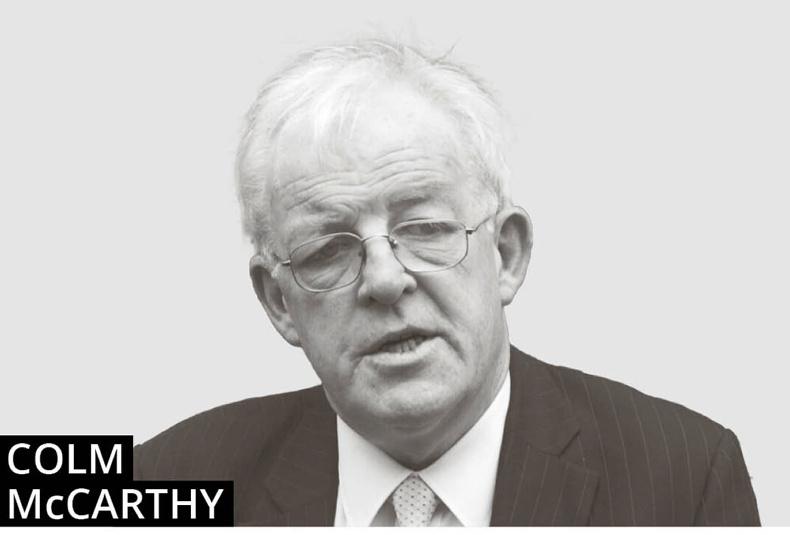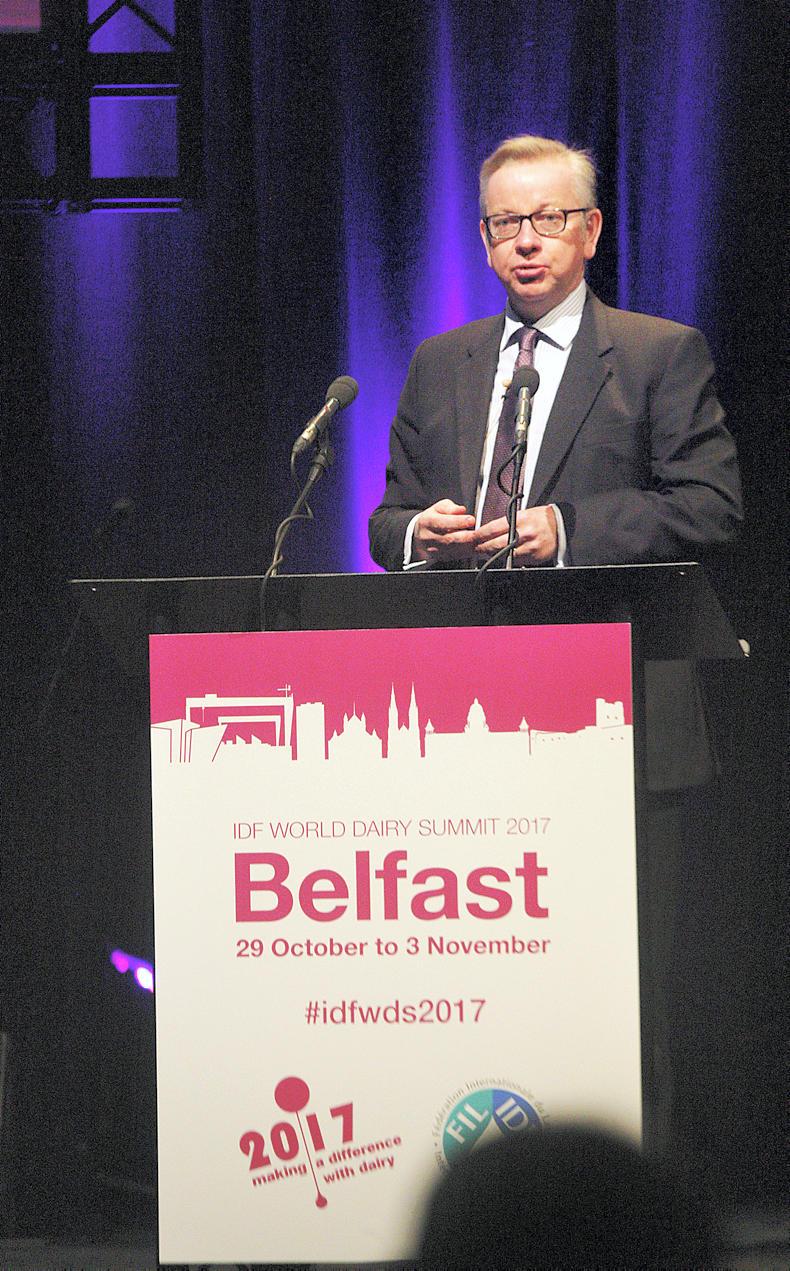UK Brexit minister David Davis turned up in Brussels on Monday morning for a joint appearance with the EU’s Michel Barnier to initiate formal negotiations on Britain’s departure from the European Union.
If you expected any clarification on the British position, you will have been disappointed. Davis departed straight back to London, where he is one of a growing field of candidates for the Tory leadership whenever Theresa May gets the gold watch. Had he stayed on for a few hours, he would have been unable to clarify the British position anyway, since there is none. Cabinet ministers are in open conflict about the deal to be done and over a full year has been wasted since the referendum.
There is rather too much optimism here in Ireland about the possible outcomes, the shape of which are largely beyond Irish influence. Even Philip Hammond, the chancellor of the exchequer and the latest to be accused of treachery by the Tory press, is publicly committed to quitting both the single market and the customs union – a “hard” form of Brexit. His offence is to favour a transition period after 29 March 2019, when Britain’s resignation from the EU becomes effective.
For this acceptance of practical reality, fully consistent with the referendum decision, he has been at the receiving end of leaks and invective from the merry band of Brexiteers, for whom a no-deal crash-out seems to be the desired outcome.
If and when Britain departs the EU, there are five broad possibilities. These are:
(i) Stay in the single market but not the customs union. (ii) Stay in the customs union but not in the single market.(ii) Stay in both.(iv) Quit both and negotiate a free-trade deal as a third country.(v) Crash out without a deal. Not enough time
The UK government’s stated position is fourth on that list: a free-trade deal as a third country. Everyone who understands what is involved believes that such a deal cannot be negotiated in the time available and that a transition period is needed.
Those most familiar with the mechanics of free-trade deals (this would be one of the biggest ever) think the transition will have to be a long one, perhaps five years or more. Hammond seems to favour a shorter transition but will doubtless have been advised that it will have to be longer.
Option (v), a no-deal crash-out, would be a disaster and I find it hard to believe that the grown-ups in British politics will permit this to happen. Aside from anything else, it would destroy the Tory party. This might not matter too much if Labour offered a plausible alternative but Labour is also split down the middle on Europe.
The first three options look improbable for various reasons. Option (i), staying in the single market, would entail continuing jurisdiction for the European Court and free movement – anathema to many Tories but also to the Corbyn wing of Labour. Option (ii) would require the sacrifice of freedom to agree unilateral trade deals outside Europe, and Brexiteers imagine that enormous opportunities would go a-begging. This is an article of faith for which supporting evidence is not needed. There is overwhelming evidence to the contrary and quitting the customs union looks like pain for no gain.
Option (iii) would be close to staying in the EU and would raise the why-bother question.
There will be a serious attempt to negotiate a free-trade deal once the real talks get under way. It will fail to conclude in the time available and will lead to a transition period. This innocuous and inevitable outcome will be labelled treachery and could bring down the government.
An outbreak of pragmatism could be see transition accompanied by retention of access to the customs union, a mixture of options (ii) and (iv). This would be seen as a climb-down by Brexiteers but would appease British business, increasingly alarmed as the implications of Brexit sink in. If the objective is damage limitation for Britain, you will be hearing more about this option in the months ahead.
However, it does not solve the hard-border problem in Ireland. The only precedent is the arrangement with Turkey, a form of partial customs union membership. There are border checks with Turkey and the deal does not cover trade in agricultural products. The retention of the frictionless border regularly promised does not look to be possible, short of a complete reversal of the Brexit decision.
A customs arrangement on the lines of the Turkey deal would still see Britain (and Northern Ireland) outside the single market and, hence, would reintroduce non-tariff barriers into Ireland-UK trade relations.
Given current British intentions, as Minister Simon Coveney has been pointing out, there is no simple path to a frictionless border.
UK Brexit minister David Davis turned up in Brussels on Monday morning for a joint appearance with the EU’s Michel Barnier to initiate formal negotiations on Britain’s departure from the European Union.
If you expected any clarification on the British position, you will have been disappointed. Davis departed straight back to London, where he is one of a growing field of candidates for the Tory leadership whenever Theresa May gets the gold watch. Had he stayed on for a few hours, he would have been unable to clarify the British position anyway, since there is none. Cabinet ministers are in open conflict about the deal to be done and over a full year has been wasted since the referendum.
There is rather too much optimism here in Ireland about the possible outcomes, the shape of which are largely beyond Irish influence. Even Philip Hammond, the chancellor of the exchequer and the latest to be accused of treachery by the Tory press, is publicly committed to quitting both the single market and the customs union – a “hard” form of Brexit. His offence is to favour a transition period after 29 March 2019, when Britain’s resignation from the EU becomes effective.
For this acceptance of practical reality, fully consistent with the referendum decision, he has been at the receiving end of leaks and invective from the merry band of Brexiteers, for whom a no-deal crash-out seems to be the desired outcome.
If and when Britain departs the EU, there are five broad possibilities. These are:
(i) Stay in the single market but not the customs union. (ii) Stay in the customs union but not in the single market.(ii) Stay in both.(iv) Quit both and negotiate a free-trade deal as a third country.(v) Crash out without a deal. Not enough time
The UK government’s stated position is fourth on that list: a free-trade deal as a third country. Everyone who understands what is involved believes that such a deal cannot be negotiated in the time available and that a transition period is needed.
Those most familiar with the mechanics of free-trade deals (this would be one of the biggest ever) think the transition will have to be a long one, perhaps five years or more. Hammond seems to favour a shorter transition but will doubtless have been advised that it will have to be longer.
Option (v), a no-deal crash-out, would be a disaster and I find it hard to believe that the grown-ups in British politics will permit this to happen. Aside from anything else, it would destroy the Tory party. This might not matter too much if Labour offered a plausible alternative but Labour is also split down the middle on Europe.
The first three options look improbable for various reasons. Option (i), staying in the single market, would entail continuing jurisdiction for the European Court and free movement – anathema to many Tories but also to the Corbyn wing of Labour. Option (ii) would require the sacrifice of freedom to agree unilateral trade deals outside Europe, and Brexiteers imagine that enormous opportunities would go a-begging. This is an article of faith for which supporting evidence is not needed. There is overwhelming evidence to the contrary and quitting the customs union looks like pain for no gain.
Option (iii) would be close to staying in the EU and would raise the why-bother question.
There will be a serious attempt to negotiate a free-trade deal once the real talks get under way. It will fail to conclude in the time available and will lead to a transition period. This innocuous and inevitable outcome will be labelled treachery and could bring down the government.
An outbreak of pragmatism could be see transition accompanied by retention of access to the customs union, a mixture of options (ii) and (iv). This would be seen as a climb-down by Brexiteers but would appease British business, increasingly alarmed as the implications of Brexit sink in. If the objective is damage limitation for Britain, you will be hearing more about this option in the months ahead.
However, it does not solve the hard-border problem in Ireland. The only precedent is the arrangement with Turkey, a form of partial customs union membership. There are border checks with Turkey and the deal does not cover trade in agricultural products. The retention of the frictionless border regularly promised does not look to be possible, short of a complete reversal of the Brexit decision.
A customs arrangement on the lines of the Turkey deal would still see Britain (and Northern Ireland) outside the single market and, hence, would reintroduce non-tariff barriers into Ireland-UK trade relations.
Given current British intentions, as Minister Simon Coveney has been pointing out, there is no simple path to a frictionless border.









SHARING OPTIONS